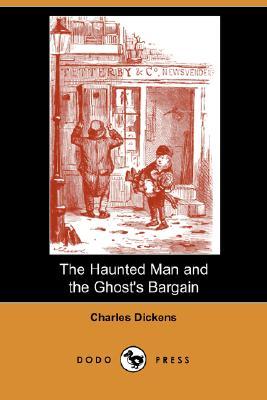First sentence: Everybody said so. Far be it from me to assert that what everybody says must be true. Everybody is, often, as likely to be wrong as right. In the general experience, everybody has been wrong so often, and it has taken, in most instances, such a weary while to find out how wrong, that the authority is proved to be fallible. Everybody may sometimes be right; “but THAT’S no rule,” as the ghost of Giles Scroggins says in the ballad. The dread word, GHOST, recalls me. Everybody said he looked like a haunted man. The extent of my present claim for everybody is, that they were so far right. He did.
Premise/plot: Redlaw (aka the Chemist) learns an important lesson near Christmas time. In the first chapter, he's tempted by a Phantom to give up what makes him human--though he doesn't realize the consequences, of course. The Spectre (ghost, phantom, spirit, etc.) takes away ALL of Redlaw's memories of sorrow, wrong, and trouble. And this is the gift that keeps on giving.
The gift that I have given, you shall give again, go where you will. Without recovering yourself the power that you have yielded up, you shall henceforth destroy its like in all whom you approach. Your wisdom has discovered that the memory of sorrow, wrong, and trouble is the lot of all mankind, and that mankind would be the happier, in its other memories, without it. Go! Be its benefactor! Freed from such remembrance, from this hour, carry involuntarily the blessing of such freedom with you. Its diffusion is inseparable and inalienable from you. Go! Be happy in the good you have won, and in the good you do!”
In the second chapter, there are CONSEQUENCES. And these consequences bring him to his knees. He learns that without feeling sorrow and remembering trouble, you have no empathy, no compassion, no concern for others. He sees the Spectre again and begs and pleads for change.
“What have you done?” returned the other, catching at his cloak. “What change have you wrought in me? What curse have you brought upon me? Give me back MYself!” “Give me back myself!” exclaimed Redlaw like a madman. “I am infected! I am infectious! I am charged with poison for my own mind, and the minds of all mankind. Where I felt interest, compassion, sympathy, I am turning into stone. Selfishness and ingratitude spring up in my blighting footsteps. I am only so much less base than the wretches whom I make so, that in the moment of their transformation I can hate them.”
“Shadow of myself! Spirit of my darker hours!” cried Redlaw, in distraction, “come back, and haunt me day and night, but take this gift away! Or, if it must still rest with me, deprive me of the dreadful power of giving it to others. Undo what I have done. Leave me benighted, but restore the day to those whom I have cursed. As I have spared this woman from the first, and as I never will go forth again, but will die here, with no hand to tend me, save this creature’s who is proof against me — hear me!”
“Oh, tell me,” exclaimed Redlaw, catching at the hope which he fancied might lie hidden in the words. “Can I undo what I have done?” “No,” returned the Phantom. “I do not ask for restoration to myself,” said Redlaw. “What I abandoned, I abandoned of my own free will, and have justly lost. But for those to whom I have transferred the fatal gift; who never sought it; who unknowingly received a curse of which they had no warning, and which they had no power to shun; can I do nothing?” “Nothing,” said the Phantom. “If I cannot, can any one?”
“I have no learning, and you have much,” said Milly; “I am not used to think, and you are always thinking. May I tell you why it seems to me a good thing for us, to remember wrong that has been done us?” “Yes.” “That we may forgive it.” “Pardon me, great Heaven!” said Redlaw, lifting up his eyes, “for having thrown away thine own high attribute!” “And if,” said Milly, “if your memory should one day be restored, as we will hope and pray it may be, would it not be a blessing to you to recall at once a wrong and its forgiveness?”
Redlaw fell upon his knees, with a loud cry. “O Thou, he said, “who through the teaching of pure love, hast graciously restored me to the memory which was the memory of Christ upon the Cross, and of all the good who perished in His cause, receive my thanks, and bless her!”My thoughts: This one was good. I almost think it would improve upon rereading. I also think it would pair really well with a much longer work like Les Miserables. It hits upon some of the same themes and is essentially one of those "what life is all about" books. That being said, it is so short it's hard to get truly, deeply attached to the characters. This is definitely an ISSUE-driven book and not a character-driven book.
© 2017 Becky Laney of Becky's Book Reviews


1 comment:
I didn't know about this one -- love the first sentences!
Post a Comment